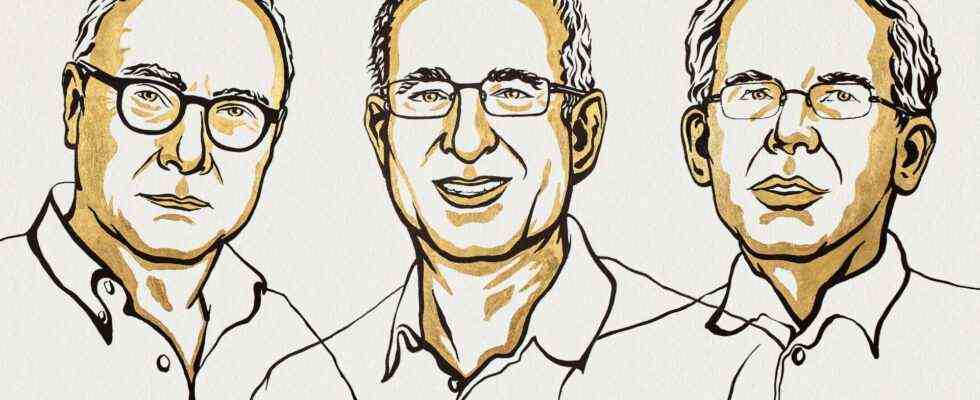Status: 11.10.2021 3:13 p.m.
The typical winner of the Nobel Prize in Economics is usually an elderly gentleman who teaches and researches at a renowned US university. It is no different this time either. And yet there is a surprise.
By Lothar Gries, tagesschau.de
When the minimum wage was introduced in Germany in 2015, the shame was great. There was talk in advance of mass layoffs, dying services and professions. The critics could have known better if they had read the studies by Canadian labor market expert David E. Card. The researcher from the University of California (UCLA) at Berkeley had already shown in the early 1990s that an increase in the minimum wage does not necessarily lead to fewer jobs. Today the researcher was awarded the Nobel Prize in Economics for this.
Minimum wage strengthens purchasing power
Card compared the impact of minimum wage increases in New Jersey on employment in fast food restaurants to neighboring Pennsylvania, where there was no such lower wage floor. In doing so, Card came to a result that came as a surprise to many: Despite the increase in the minimum wage, employment in New Jersey increased – because local purchasing power improved. With this Card refuted the thesis that the level of wages and salaries has a direct effect on unemployment.
It was the same in this country. After the introduction of the minimum wage, the number of jobs even increased and the unemployment rate fell. Since then, Card has been a fan of minimum wage advocates around the world. Nevertheless, Card was not a favorite for the Nobel Prize in Economics because the data from his research are often difficult to interpret. The Royal Swedish Academy of Sciences in Stockholm was nevertheless convinced and awarded Card one half of the prestigious award for his empirical contributions to labor market economics, as the Academy’s Secretary General, Göran Hansson, said at the announcement.
“New insights into the labor market”
Card has to share the price with the American Joshua D. Angrist from the Massachusetts Institute of Technology (MIT) in Cambridge and Guido W. Imbens from Stanford University from the Netherlands. Both were honored “for their methodological contributions to the analysis of causal relationships”. All three researchers “provided us with new insights into the labor market and showed what conclusions can be drawn about cause and effect from natural experiments,” the academy justified its decision.
“Your approach has spilled over into other areas and revolutionized empirical research.” Many of the big questions in the social sciences have to do with cause and effect – such as how immigration affects wages and employment levels. These questions are difficult to answer because there are no comparisons. “We don’t know what would have happened if there had been less immigration,” said the academy. However, this year’s award winners have shown that it is possible to answer these and similar questions with natural experiments.
Ifo President welcomes the award
German economists welcomed the selection. Ifo President Clemens Fuest called the decision a “very good choice”. The three scientists’ research has “great practical utility” because they have developed methods to determine cause and effect. This is important to find out “how economic policy measures work”. Fuest had previously favored the Austrian-Swiss economist Ernst Fehr. He made groundbreaking contributions in experimental economic research and behavioral research.
Economics professor Jens Südekum from Heinrich Heine University in Düsseldorf also welcomed today’s decision. “I’m super happy with the selection and can’t think of any more worthy award winners than these three, they have changed the Econ world,” tweeted Südekum.
The Prize for Economics occupies a special position among the Nobel Prizes: It was only awarded for the first time in 1969, almost seven decades after the first award ceremony in 1901. As the only one of the prizes, it does not go back to Alfred Nobel’s will, which is the basis for forms the Nobel Peace Prize and the Nobel Prize for Literature as well as the awards in the natural sciences.
First a German
Instead, the prize was subsequently donated by the Swedish Reichsbank on the occasion of its 300th year of foundation in 1968. The chemist and industrialist Alfred Nobel is said to have found economics not worthy of the award. As with the Nobel Prizes in Physics and Chemistry, the winners are nevertheless nominated by the Royal Swedish Academy of Sciences.
Only one German has been represented among the Nobel laureates in economics: the Bonn scientist Reinhard Selten received it in 1994 together with John Nash and John Harsanyi for their contributions to non-cooperative game theory. And there is another special feature – so far only two women have been awarded the prestigious prize: Elinor Ostrom (1933 to 2012) in 2009 for her research on the management of natural resources. In 2019, the French Esther Duflo, together with her life and research partner Abhijit Banerjee and Michael Kremer, was honored for her research on poverty reduction.

